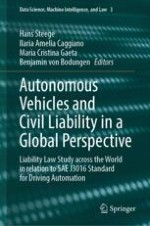2024 | OriginalPaper | Buchkapitel
Self-Driving Cars Regulation in Colombia
verfasst von : Juan F. Córdoba-Marentes, Obdulio Velásquez-Posada
Erschienen in: Autonomous Vehicles and Civil Liability in a Global Perspective
Aktivieren Sie unsere intelligente Suche, um passende Fachinhalte oder Patente zu finden.
Wählen Sie Textabschnitte aus um mit Künstlicher Intelligenz passenden Patente zu finden. powered by
Markieren Sie Textabschnitte, um KI-gestützt weitere passende Inhalte zu finden. powered by
